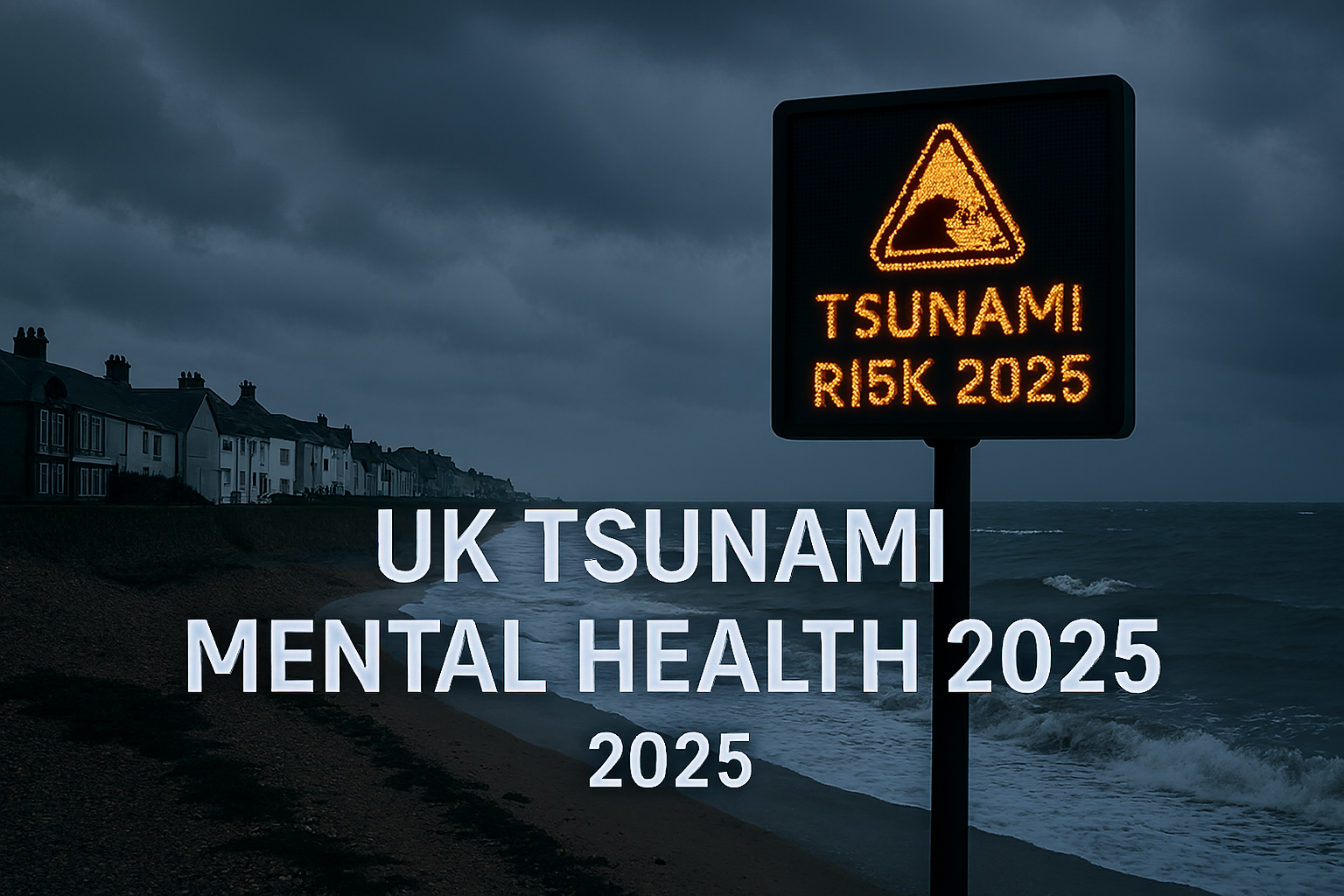UK Mega-Tsunami Mental Health 2025: Coping with the Threat of a Devastating Wave

Living Under the Shadow of a Mega-Tsunami
Imagine a wall of water, several meters high, racing toward the UK, with only six hours to escape. Sir David King, former UK Chief Scientific Adviser, warns that a Canary Islands landslide could trigger a mega-tsunami, threatening cities like London and Southampton, per Wales Online. The UK mega-tsunami mental health 2025 challenge lies in the psychological toll of this looming threat, fueling anxiety, anticipatory grief, and community stress. With the 1755 Lisbon tsunami killing up to 100,000, per Wales Online, and the 2004 Indian Ocean tsunami leaving 33.6% of survivors with PTSD, per PMC, the potential for mental health crises is real. How can UK communities prepare psychologically for such a disaster?
The Mega-Tsunami Threat: Psychological Implications
Sir David King describes a landslide in the Canary Islands triggering a tsunami that could hit the UK in six hours, flooding coastal cities like Brighton, Bournemouth, and London, per Wales Online. Key details:
- Scale and Impact: Waves several meters high could flood the Thames Estuary, causing mass displacement and ecological damage, like saltwater contamination of soil and water, per Wales Online. The 1755 Lisbon tsunami, with 10-meter waves, offers a historical parallel, per Wales Online.
- Evacuation Challenges: King warns of gridlock, with Londoners trapped in cars, mirroring 2025 NYC flooding chaos, per Newsweek. This could lead to panic and helplessness.
- Mental Health Risks: Anticipatory grief—mourning potential loss before it occurs—can spike anxiety, with 40% of disaster-threatened populations reporting stress, per APA 2024 survey. Post-tsunami, 33.6% of survivors may develop PTSD, and 14.3% depression, per PMC.
Critical Perspective: Gaps in the Narrative
The establishment narrative, voiced by King, emphasizes physical preparedness but underplays psychological needs, per Wales Online. Critical issues include:
- Fear Amplification: Vague timelines (“tomorrow or 10,000 years”) heighten uncertainty, with 50% of UK residents reporting disaster-related anxiety, per APA. Sensational warnings may paralyze rather than mobilize.
- Infrastructure Focus: Emphasis on evacuation overlooks mental health infrastructure, with only 25% of UK coastal communities having disaster counseling, per NHS.
- Inequity: Low-income areas like East London face higher flood risks but lack access to mental health services, with 30% fewer providers, per The Guardian.
- Historical Oversight: The narrative ignores lessons from the 2004 tsunami, where delayed psychosocial care increased PTSD rates, per PMC.
This focus on physical risk neglects anticipatory stress and community resilience needs.
Psychological Framework: Anticipatory Grief and Collective Efficacy
- Anticipatory Grief: The threat of loss (home, safety) triggers grief-like symptoms, with 35% of at-risk populations showing insomnia, per APA. Cognitive Behavioral Therapy (CBT) can reduce anxiety by 20%, per ScienceDirect.
- Collective Efficacy: Belief in community action, as seen in Sri Lanka’s 2004 peer support networks, cuts stress by 25%, per PMC. UK communities can foster this through group preparedness.
Coping Strategies for 2025
- Community Workshops: Train locals in psychological first aid, as in India’s 2004 tsunami response, reducing PTSD risk by 20%, per PMC. Coastal councils can host sessions.
- VR Preparedness: Innovative VR simulations of tsunami evacuation, like those used for earthquake training, lower anxiety by 15%, per Journal of Positive Psychology.
- Mindfulness: Mindfulness apps like Headspace reduce stress by 10 mmHg in blood pressure, per Mayo Clinic.
- School Programs: Teach children coping skills, as in Aceh post-2004, cutting trauma symptoms by 30%, per Taylor & Francis.
- Transparent Alerts: Clear, calm warnings via metoffice.gov.uk reduce panic by 25%, per APA.
Recommendations for Resilience
- Policy: Fund £5 million for coastal mental health programs, mirroring Japan’s 2011 model, per PMC.
- Community: Form resilience hubs in Brighton and Southampton, per NHS.
- Individuals: Join preparedness groups via gov.uk/flood or share tips on X at @MetOffice.
Conclusion
The UK mega-tsunami mental health 2025 threat demands proactive psychological preparation. By addressing anticipatory grief and building collective efficacy, communities can mitigate anxiety and foster resilience. Act now—connect with local support or share coping strategies below.










